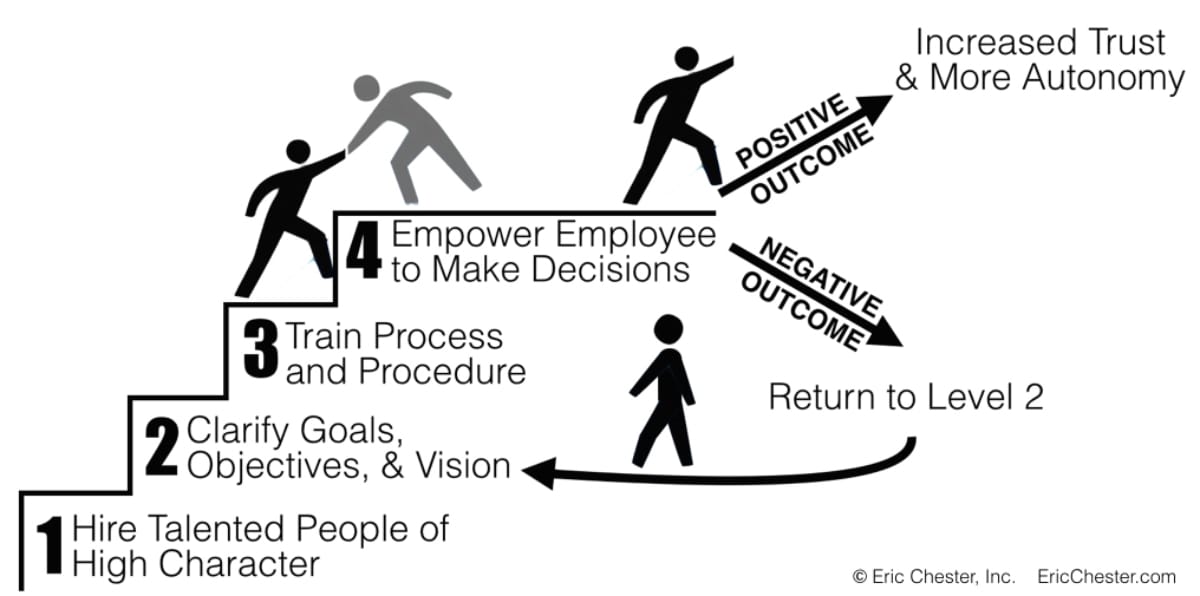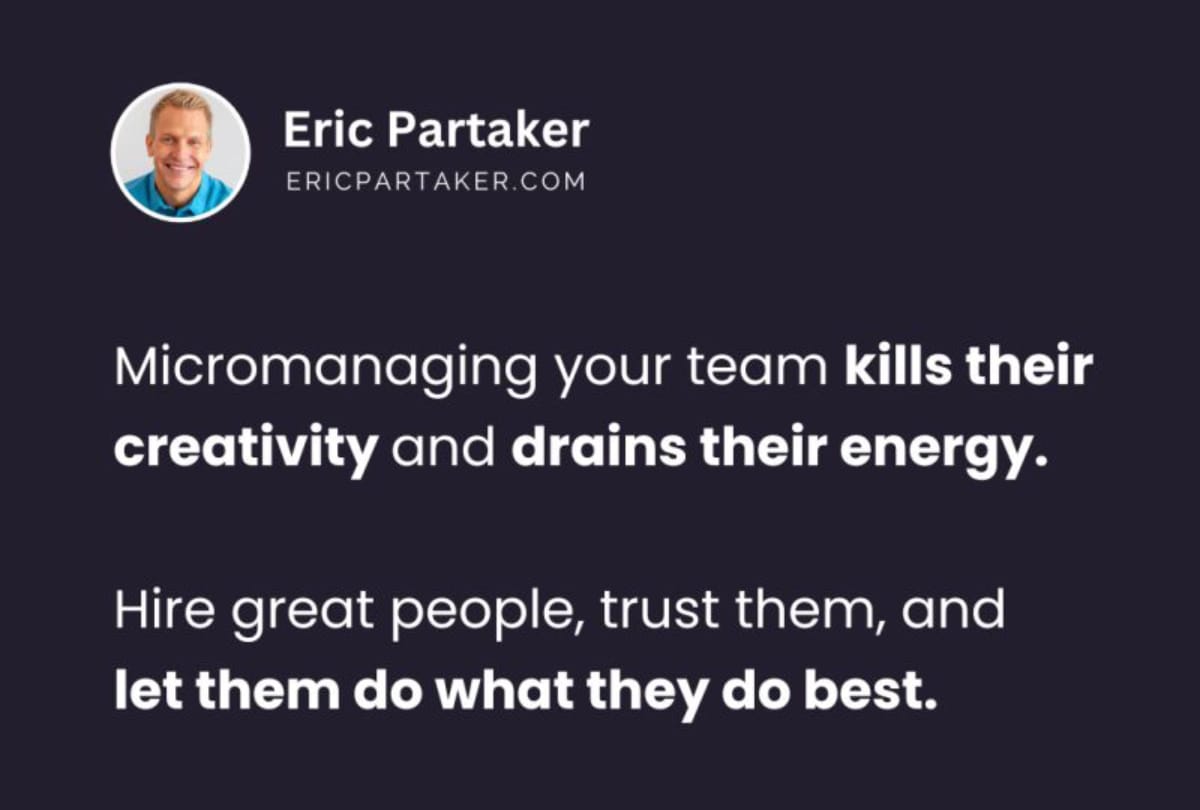7 Reasons [Micromanaging] is Killing Your Team
![Cosmico - 7 Reasons [Micromanaging] is Killing Your Team](/content/images/size/w1200/2024/02/micromanaging_killing_your_team_2024_cosmico_business_tech_insights.jpg)
The fine line between close supervision and micromanagement is often blurred. Micromanagement, characterized by excessive control over employees' work and an unwillingness to delegate, is a common yet counterproductive leadership approach. While its intention might stem from a desire for perfection, the repercussions are far from ideal.
We will discuss 7 critical reasons why micromanaging is detrimental to team success, shedding light on its impact on employee autonomy, morale, turnover rates, innovation, dependence, adaptability, and trust. Understanding these effects is paramount for managers and leaders aiming to create a supportive, dynamic, and successful team environment.
Reason 1) Decreases Employee Autonomy

Micromanagement is like a shadow that constantly looms over employees, dimming their spark of independence and creativity. At its core, this management style is based on the belief that nothing can be done correctly without the manager’s direct oversight. However, this approach is fundamentally flawed as it fails to recognize the immense value of employee autonomy. Autonomy isn't just about giving employees the freedom to choose how they work; it's about empowering them to make decisions, innovate, and drive their projects forward. When managers micromanage, they strip away this empowerment, leading to a workforce that feels undervalued and stifled.
Why Autonomy Matters
Autonomy is directly linked to job satisfaction and engagement. Studies have shown that when employees feel they have control over their work, they are more motivated, engaged, and committed to excellence. This sense of ownership encourages them to find innovative solutions to problems and take pride in their contributions. Conversely, the lack of autonomy can make employees feel like cogs in a machine, leading to disengagement and a lack of motivation.

Encourage Autonomy
The key to encouraging autonomy is trust. Managers need to trust that their employees are capable and will seek guidance when necessary. Setting clear expectations and providing the resources needed for success are foundational. Instead of dictating every step, managers should focus on the outcome and allow employees to navigate their path to achieving it. This approach not only enhances job satisfaction but also frees up managers to focus on strategic planning rather than day-to-day oversight.
Empowering Employees
Empowering employees to take charge of their work requires a shift in mindset. Managers should encourage team members to set their goals, contribute to decision-making, and take initiative. Regular check-ins can replace constant oversight, providing a space for feedback and support without encroaching on autonomy. Celebrating successes, no matter how small, and learning from failures without assigning blame can cultivate an environment where autonomy leads to innovation and growth.
Reason 2) Lowers Employee Morale and Job Satisfaction

Micromanagement doesn't just rob employees of their autonomy; it deeply impacts their morale and overall job satisfaction. When managers hover over every decision, request frequent updates, and critique minor details, it sends a clear message to employees: their judgment and abilities are not trusted. This constant scrutiny can be incredibly demoralizing, leading to a work environment where employees feel undervalued, overburdened, and anxious. The psychological toll of being micromanaged is profound, affecting not just the professional life of an individual but their personal well-being too.
The Psychology Behind Morale
Employee morale is the emotional backbone of the workplace. It influences how motivated, enthusiastic, and committed employees are towards their work and the organization. High morale is often characterized by a vibrant, energized workforce that takes pride in their achievements and is willing to go the extra mile. Conversely, low morale manifests as disengagement, absenteeism, and a pervasive sense of dissatisfaction. Micromanagement, by undermining employees' confidence and autonomy, acts as a direct antagonist to high morale.
Micromanagement's Impact on Job Satisfaction
Job satisfaction is closely tied to how employees perceive their roles and contributions within an organization. Employees want to feel that their work is meaningful and that they have the opportunity to grow and develop. Micromanagement stifles these aspects by focusing on the minutiae rather than the bigger picture. It can make employees question their competence and the value of their contributions, leading to dissatisfaction and a lack of fulfillment from their work.
Cultivating a Positive Work Environment
To combat the negative impacts of micromanagement on morale and job satisfaction, leaders must cultivate a positive work environment that recognizes and values employee contributions. This involves offering constructive feedback, celebrating achievements, and providing opportunities for professional growth. Encouraging open communication and creating a culture of respect and recognition can help rebuild morale and increase job satisfaction. Additionally, involving employees in decision-making processes and giving them a sense of ownership over their work can significantly enhance their engagement and satisfaction levels.
Practical Steps for Managers
- Promote Open Communication: Create an environment where feedback flows both ways. Encourage employees to share their ideas and concerns without fear of retribution.
- Set Clear Goals: Provide clear, achievable goals and let employees figure out the best way to reach them, offering support as needed.
- Celebrate Successes: Make it a point to recognize and celebrate successes, both big and small, to boost morale and reinforce the value of employee contributions.
- Provide Growth Opportunities: Ensure employees have opportunities to learn new skills and take on challenges, which can increase job satisfaction and personal development.
Reason 3) Leads to Higher Employee Turnover

One of the most tangible and costly consequences of micromanagement is an increase in employee turnover. When employees feel suffocated by constant oversight and undervalued due to a lack of trust from their managers, the workplace becomes a source of stress rather than fulfillment. This environment not only diminishes their engagement and productivity but also pushes them towards the exit. High turnover is a significant issue for organizations, not just in terms of the financial cost associated with recruiting and training new staff but also due to the loss of institutional knowledge and the negative impact on team morale.
The Cost of High Turnover
The financial implications of high turnover are substantial. It encompasses the direct costs of recruiting, interviewing, hiring, and training new employees, as well as the indirect costs such as lost productivity, decreased morale among remaining employees, and the potential loss of customer satisfaction and business. Moreover, frequent turnover disrupts the cohesion and efficiency of teams, making it difficult to maintain consistent performance and achieve long-term goals.
Why Micromanagement Drives Turnover
Micromanagement leads to turnover for several reasons. First, it creates an oppressive work environment where employees feel they are not trusted to perform their duties without constant supervision. This lack of trust undermines their professional confidence and satisfaction, making them feel undervalued. Second, micromanagement stifles professional growth by not allowing employees the opportunity to take on new challenges or learn from their mistakes. Without the possibility for growth and development, employees are more likely to seek opportunities elsewhere. Finally, the stress and frustration caused by micromanagement can lead to burnout, further driving employees away from the organization.

Best Practices for Retention
To mitigate the risk of high turnover, organizations must adopt strategies that counteract the effects of micromanagement:
- Empower and Trust Employees: Encourage autonomy by trusting employees to make decisions and manage their workload. Empowerment boosts confidence and job satisfaction, which are critical for retention.
- Invest in Professional Development: Provide opportunities for employees to grow and develop their skills. This shows that the organization values their contributions and is invested in their future.
- Foster a Positive Work Environment: Create a culture of recognition and appreciation. Celebrate achievements and provide constructive feedback in a way that encourages improvement and learning.
- Encourage Work-Life Balance: Promote a healthy work-life balance to prevent burnout. Recognize the importance of personal time and offer flexible work arrangements when possible.
Reason 4) Hampers Team Innovation and Creativity

Innovation and creativity are the lifeblood of any organization striving to stay ahead in today’s fast-paced and ever-changing business environment. These elements are essential for problem-solving, improving processes, and developing new products or services. However, micromanagement acts as a significant barrier to creating an innovative and creative workplace. By focusing on control and minimizing risk, micromanagers inadvertently suppress the creative thinking and initiative that drive organizational growth and adaptability.
The Impact of Micromanagement on Creativity
Creativity thrives in environments where individuals feel free to explore ideas, take calculated risks, and learn from failures. Micromanagement, with its emphasis on adherence to specific procedures and immediate results, limits these opportunities. Employees under micromanagement often find themselves in a restrictive environment where following orders is valued over innovative thinking. This not only diminishes the potential for creative breakthroughs but also discourages employees from proposing new ideas or solutions, fearing criticism or dismissal.

Stifling Innovation
Innovation requires experimentation, iteration, and sometimes, failure. Micromanagers’ aversion to risk and failure means that teams are less likely to engage in the kind of speculative thinking and experimentation that leads to breakthrough innovations. Instead, teams may stick to the "safe" paths and known solutions, stunting growth and adaptation. This resistance to change can leave organizations lagging behind more agile competitors who embrace innovation as a core value.
Strategies to Foster Innovation and Creativity
To counteract the negative impact of micromanagement on innovation and creativity, leaders should adopt several key strategies:
- Encourage Autonomy: Give teams the freedom to explore and implement their ideas. Autonomy creates a sense of ownership and accountability, which can drive innovative thinking and solutions.
- Create a Safe Space for Failure: Cultivate an environment where failure is seen as a step towards innovation. Encouraging calculated risk-taking and viewing mistakes as learning opportunities can inspire creativity.
- Promote Diverse Thinking: Encourage diversity in teams, not just in terms of demographics but also in thinking styles and experiences. A diverse team is more likely to generate a wide range of ideas and innovative solutions.
- Implement Idea-Sharing Platforms: Use meetings, brainstorming sessions, and digital platforms to share and develop ideas. Recognizing and rewarding innovative ideas can motivate employees to think creatively.
Reason 5) Creates a Culture of Dependence

Micromanagement not only stifles innovation and creativity but also cultivates a pervasive culture of dependence within teams. This environment discourages employees from making decisions without explicit directions from their managers, severely limiting their growth and development. Over time, this reliance on constant supervision erodes employees' confidence in their abilities and judgment, creating a workforce that is hesitant to take initiative or act independently.
The Mechanics of Dependence
The culture of dependence arises from a cycle of micromanagement where employees are accustomed to receiving detailed instructions for every task. In such settings, the fear of making mistakes or the belief that initiatives without prior approval will be frowned upon discourages independent action. As a result, employees wait for directions for even the most trivial decisions, leading to delays in project execution and reduced efficiency.
Implications for Professional Growth
Professional growth is fueled by opportunities to tackle challenges, solve problems, and make decisions. However, in a culture of dependence, these opportunities are scarce. Employees deprived of the chance to navigate challenges on their own may find their skill development and career progression stunted. This lack of growth not only affects their professional trajectory but also diminishes their engagement and satisfaction with their job.
Breaking the Cycle of Dependence
To dismantle the culture of dependence and create a more dynamic and empowered workforce, leaders must adopt a deliberate and strategic approach:
- Delegate Meaningfully: Assign responsibilities that challenge employees and encourage them to stretch their capabilities. Meaningful delegation demonstrates trust in their abilities and judgment.
- Encourage Decision-Making: Empower employees to make decisions within their scope of work. Establish clear boundaries and provide the necessary support to make those decisions confidently.
- Provide Constructive Feedback: Instead of focusing on mistakes, provide feedback that helps employees learn and grow. Encourage a mindset where errors are seen as learning opportunities.
- Celebrate Initiative: Recognize and reward employees who take initiative. This not only boosts their confidence but also encourages others to act independently.
Reason 6) Impedes Crisis Management and Adaptability

Businesses must pivot swiftly in response to global challenges and market volatility, the ability to manage crises and adapt quickly is invaluable. However, micromanagement significantly undermines these capabilities. By centralizing decision-making and discouraging autonomy, micromanagement leaves teams ill-prepared for the rapid response required in crisis situations. This lack of preparedness and flexibility can exacerbate the impact of crises, hindering an organization's ability to navigate through turbulent times effectively.
Micromanagement and Decision-Making Bottlenecks
One of the primary ways micromanagement impedes crisis management is by creating decision-making bottlenecks. In micromanaged environments, decisions must often be escalated to the manager, slowing down response times and impeding swift action. During crises, this delay can be detrimental, as the window for effective response may be narrow. Teams accustomed to operating independently and making quick decisions are far better equipped to handle emergencies and adapt to changes.
Stifling Adaptability
Adaptability—the ability to adjust to new conditions—is crucial for business continuity and growth. Micromanagement, by discouraging experimentation and risk-taking, stifles this adaptability. Employees trained to follow orders without deviation find it challenging to think outside the box or innovate in response to changing circumstances. This resistance to change can leave organizations trailing behind more agile competitors who empower their employees to adapt and innovate.
Encourage a Responsive and Adaptable Workforce
To overcome the limitations imposed by micromanagement on crisis management and adaptability, organizations should:
- Empower Teams: Empower employees with the authority to make decisions relevant to their roles, especially in high-pressure situations. This empowerment can lead to quicker, more effective responses to crises.
- Promote a Culture of Learning: Encourage a mindset where learning from mistakes is valued over punishment. This approach creates an environment where employees are more willing to take calculated risks and adapt.
- Develop Flexible Leadership Styles: Train leaders to adopt a more flexible leadership style that can adjust according to the situation's demands, balancing guidance with autonomy.
Reason 7) Erodes Trust Between Managers and Employees

Trust is the cornerstone of any successful manager-employee relationship. It forms the foundation for effective communication, team cohesion, and a positive work environment. However, micromanagement erodes this crucial trust, leading to a breakdown in the manager-employee relationship. This erosion not only impacts the immediate team dynamics but also has long-term repercussions on the organization's culture and performance.
How Micromanagement Undermines Trust
Micromanagement signals to employees that their managers lack confidence in their abilities to perform tasks independently and make decisions. This lack of trust can be demoralizing for employees, who feel their skills and contributions are undervalued. Over time, this perception creates a rift between managers and their teams, with employees becoming less likely to seek guidance, share ideas, or report issues, fearing criticism or dismissal. The result is a work environment where communication is stifled, innovation is hampered, and resentment builds.
The Ripple Effects of Distrust
The consequences of eroded trust extend beyond the manager-employee relationship. Teams in which trust is lacking often exhibit lower morale, reduced collaboration, and increased conflict. Without trust, the free flow of information is impeded, making it difficult for teams to function effectively. Moreover, the lack of a supportive, trust-based culture can affect employee retention, as employees are more likely to leave an environment where they feel undervalued and mistrusted.
Rebuilding Trust
Rebuilding trust after it has been damaged by micromanagement requires intentional effort and a commitment to change. Here are some strategies managers can employ to restore trust:
- Acknowledge and Address the Issue: Managers must acknowledge the impact of their micromanagement and express a genuine commitment to change.
- Foster Open Communication: Create channels for open, honest communication. Encourage feedback and actively listen to employee concerns and suggestions.
- Delegate Effectively: Show trust in employees' abilities by delegating tasks and decision-making authority. This empowers employees and demonstrates confidence in their capabilities.
- Celebrate Successes and Learn from Mistakes: Recognize and reward team achievements. Approach mistakes as learning opportunities rather than occasions for blame.
- Be Transparent: Share information about decisions and changes. Transparency creates trust by making employees feel valued and included.
Final Thoughts
Our journey through the negative impacts of micromanagement reveals its far-reaching consequences on team dynamics, innovation, and organizational health. Micromanagement not only diminishes employee autonomy and satisfaction but also creates a culture of dependence, stifles creativity, and erodes trust—key elements that are vital for a thriving workplace. The evidence underscores the necessity for leaders to shift from controlling to empowering, highlighting the importance of trust, autonomy, and open communication in creating a positive and productive work environment.
Embracing a leadership style that values and nurtures the potential of each team member is essential for driving innovation and ensuring organizational resilience. By prioritizing empowerment over oversight, managers can cultivate a culture where employees feel valued, engaged, and motivated to contribute their best. This transition is not merely beneficial but critical for building a successful and sustainable organization in the competitive landscape of the future.
Key Takeaways
| Reason Micromanagement is Harmful | Key Takeaway |
|---|---|
| 1. Decreases Employee Autonomy | Empower employees by trusting them to make decisions, fostering innovation and job satisfaction. |
| 2. Lowers Employee Morale and Job Satisfaction | Cultivate a positive work environment that values contributions and supports professional growth. |
| 3. Leads to Higher Employee Turnover | Reduce turnover by building trust and offering opportunities for development, showing investment in employees' futures. |
| 4. Hampers Team Innovation and Creativity | Encourage a culture of experimentation and risk-taking to fuel creativity and adaptability. |
| 5. Creates a Culture of Dependence | Promote independence through meaningful delegation and encourage initiative to enhance problem-solving skills. |
| 6. Impedes Crisis Management and Adaptability | Develop flexible leadership styles that allow for quick decision-making and adaptation in crisis situations. |
| 7. Erodes Trust Between Managers and Employees | Rebuild trust by being transparent, sharing information, and engaging in open, two-way communication. |
Top Books on Micromanaging
- "Leaders Eat Last: Why Some Teams Pull Together and Others Don't" by Simon Sinek: Sinek explores the dynamics of trust and leadership in this book, highlighting the importance of creating a "Circle of Safety" within teams. By creating an environment of trust and support, leaders can reduce the need for micromanagement and enable teams to thrive.
- "Empower: What Happens When Students Own Their Learning" by John Spencer and A.J. Juliani: While primarily focused on education, this book offers valuable insights into the power of empowerment and autonomy. By understanding how to empower students, educators can learn strategies applicable to empowering teams in any context, thereby reducing the urge to micromanage.
- "Mindful Leadership: The 9 Ways to Self-Awareness, Transforming Yourself, and Inspiring Others" by Maria Gonzalez: Mindfulness can be a powerful tool for overcoming micromanagement tendencies. This book offers practical guidance on developing self-awareness, managing stress, and cultivating empathy and compassion, all of which are essential for effective leadership without micromanaging.
- "The Power of Habit: Why We Do What We Do in Life and Business" by Charles Duhigg: This book explores the science behind habits and how they shape our behavior. Understanding the habit loop—cue, routine, reward—can help individuals identify and change micromanagement tendencies by replacing them with more productive habits.
- "Dare to Lead: Brave Work. Tough Conversations. Whole Hearts." by Brené Brown: Brené Brown offers insights into courageous leadership in this book, emphasizing the importance of vulnerability, empathy, and trust. By embracing vulnerability and creating psychological safety within teams, leaders can create environments where micromanagement is less prevalent.





